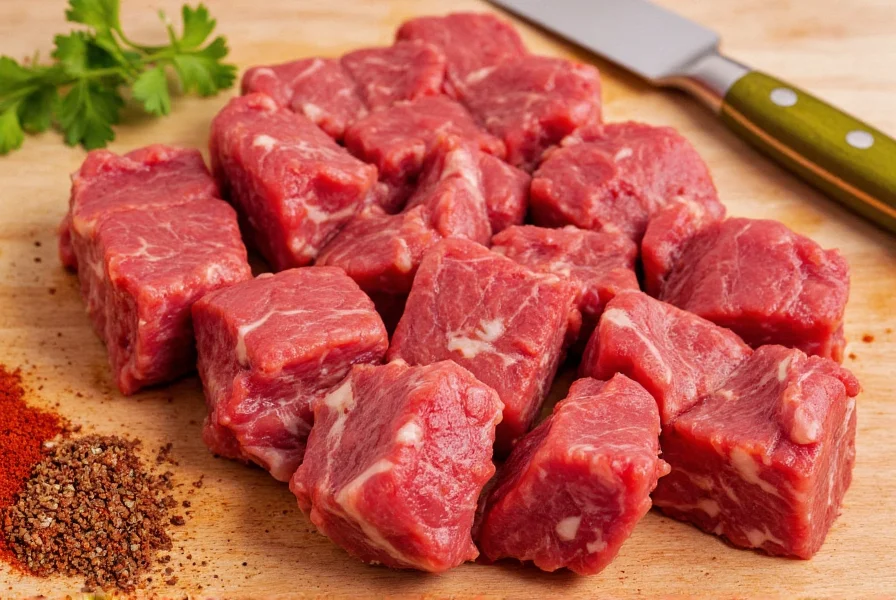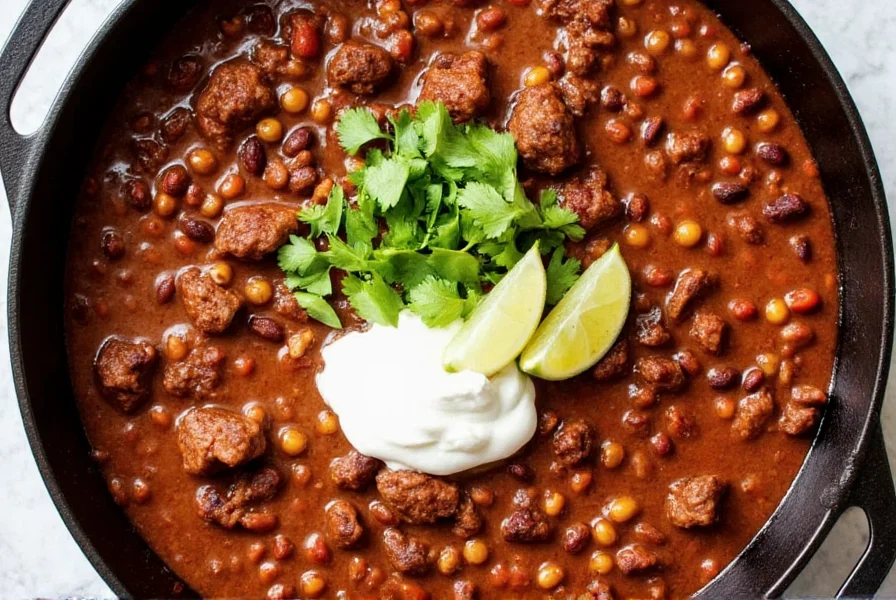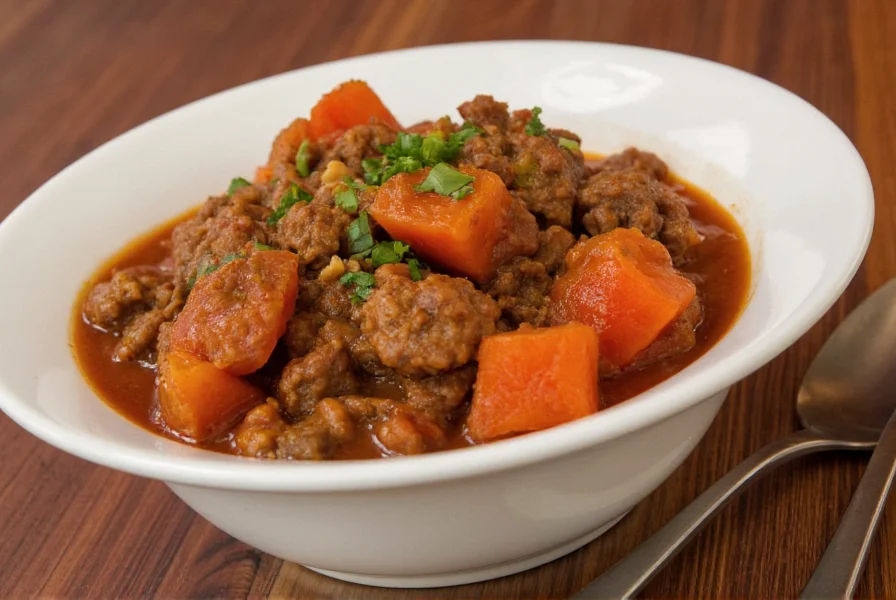If you're searching for a robust alternative to standard ground beef chili, beef steak chili recipe delivers exceptional depth of flavor and satisfying texture. This guide reveals professional techniques for transforming simple ingredients into an authentic, restaurant-quality steak chili that stands apart from ordinary versions.
Why Steak Outperforms Ground Beef in Chili
While traditional chili uses ground beef, upgrading to steak creates a superior dish for several reasons. Chuck steak for chili contains ideal marbling that melts during slow cooking, infusing the broth with rich beef essence. The connective tissue breaks down into gelatin, naturally thickening your chili without needing flour or cornstarch.
When selecting meat, avoid lean cuts like sirloin that dry out during extended cooking. Instead, choose well-marbled beef chuck roast for steak chili or brisket. These cuts contain 20-30% fat content, crucial for developing complex flavors. Cut your steak into uniform 3/4-inch cubes to ensure even cooking—smaller pieces disintegrate, while larger chunks remain tough.

The Historical Journey of Steak Chili
Steak chili's evolution reflects America's culinary adaptation, originating with 19th-century Texas cowboys who simmered cubed beef with dried chilies over open fires—a method documented in the Texas State Historical Association archives. This original "chili con carne" contained no beans or tomatoes, distinguishing it from Cincinnati's Mediterranean-spiced spaghetti-topped version developed in the 1920s. The modern steak chili adaptation emerged in the 1990s as chefs preserved traditional texture while accommodating regional preferences for beans and tomatoes, creating today's balanced interpretation.
Essential Ingredients for Authentic Steak Chili
The magic of authentic Texas-style steak chili lies in its ingredient balance. Unlike Cincinnati or Midwestern variations, true steak chili minimizes beans and tomatoes to highlight the beef. However, modern interpretations often include both for added texture and acidity.
| Regional Style | Origin Period | Key Characteristics | Meat Preparation | Bean Usage | Tomato Presence |
|---|---|---|---|---|---|
| Texas Red | 1800s | Pure meat focus, deep chili pepper complexity | Cubed beef | None | None |
| Cincinnati Chili | 1920s | Mediterranean spices, served over spaghetti | Finely ground | None (base) | Minimal |
| Midwestern Chili | 1930s | Bean-forward, tomato-accented | Ground beef | Mandatory (2+ types) | Significant |
| Modern Steak Chili | 2000s | Texture-focused with balanced acidity | Cubed chuck/brisket | Optional (kidney beans) | Moderate (fire-roasted) |
Regional distinctions verified through Texas chili archives, Cincinnati historical records, and Smithsonian food anthropology research
| Core Ingredients | Quantity | Professional Tip |
|---|---|---|
| Beef chuck steak, cubed | 2 lbs | Sear in batches to avoid steaming |
| Fire-roasted diced tomatoes | 1 (28oz) can | With juices for natural sweetness |
| Dark beer or beef broth | 1 cup | Guinness enhances umami notes |
| Chili powder blend | 3 tbsp | Mix ancho, chipotle, and New Mexico |
| Smoked paprika | 1 tbsp | Essential for smoky steak chili recipe |
Step-by-Step Steak Chili Preparation
Follow these professional techniques for thick and hearty steak chili recipe success:
- Sear steak properly: Pat cubes dry, season with salt, and sear in hot oil until deeply browned (2-3 minutes per side). Work in batches to prevent overcrowding.
- Build flavor foundation: After removing steak, sauté onions and garlic until caramelized. Add tomato paste and cook 2 minutes until brick red.
- Bloom spices: Stir in chili powder, cumin, and paprika, cooking 1 minute to release essential oils.
- Simmer patiently: Return steak to pot with tomatoes, beer, and 1 cup water. Simmer covered for 2-3 hours until fork-tender.
- Final thickening: Remove lid for last 30 minutes to concentrate flavors. Stir in kidney beans during final 15 minutes.
Avoiding Common Steak Chili Mistakes
Even experienced cooks make critical errors with beef steak chili from scratch. Avoid these pitfalls:
- Overcooking beans: Add canned beans during the final 15 minutes to prevent mushiness
- Rushing the sear: Proper browning creates Maillard reaction compounds essential for depth
- Skipping acid balance: Finish with 1 tbsp lime juice or apple cider vinegar to brighten flavors
- Incorrect heat level: Maintain gentle simmer—boiling makes steak tough and broth cloudy
Contextual Considerations for Steak Chili
Steak chili excels in specific scenarios but has clear limitations. Its 2-3 hour simmering requirement makes it impractical for weeknight dinners without pressure cooking equipment, as confirmed by USDA cooking guidelines for tough cuts. Nutritionally, the 20-25% fat content in chuck roast (per USDA Food Safety and Inspection Service data) delivers superior flavor but increases caloric density—approximately 420 calories per serving versus 320 in lean ground beef versions. This preparation shines during cold-weather entertaining where slow cooking enhances social experience, yet ground beef remains preferable for budget-conscious meals or quick lunches. Notably, steak chili's texture advantage diminishes when using pre-cooked steak, requiring careful attention to cooking timelines.

Serving Suggestions and Variations
Elevate your spicy beef steak chili recipe with these professional touches:
- Texture contrast: Top with crushed oyster crackers or fried tortilla strips
- Creamy balance: Add dollop of sour cream or avocado crema to cut heat
- Heat customization: Offer jalapeño slices on side for adjustable spice
- Make-ahead advantage: Steak chili tastes better the next day as flavors meld
For easy beef steak chili for slow cooker, follow initial searing steps, then transfer to crockpot and cook on low for 6-8 hours. The slow cooker method produces exceptionally tender steak but requires finishing on stove to thicken properly.
Storage and Reheating Instructions
Proper storage maintains quality of your healthy steak chili recipe. Cool completely before transferring to airtight containers. Refrigerate for up to 4 days or freeze for 3 months.
When reheating, add small amounts of broth or water to restore ideal consistency. Gently warm over medium-low heat, stirring occasionally. Avoid boiling, which can make steak stringy. For frozen chili, thaw overnight in refrigerator before reheating.











 浙公网安备
33010002000092号
浙公网安备
33010002000092号 浙B2-20120091-4
浙B2-20120091-4